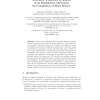Free Online Productivity Tools
i2Speak
i2Symbol
i2OCR
iTex2Img
iWeb2Print
iWeb2Shot
i2Type
iPdf2Split
iPdf2Merge
i2Bopomofo
i2Arabic
i2Style
i2Image
i2PDF
iLatex2Rtf
Sci2ools
85
Voted
ERSHOV
2003
Springer
2003
Springer
Automatic Evaluation of Quality of an Explanatory Dictionary by Comparison of Word Senses
Words in the explanatory dictionary have different meanings (senses) described using natural language definitions. If the definitions of two senses of the same word are too similar, it is difficult to grasp the difference and thus it is difficult to judge which of the two senses is intended in a particular contexts, especially when such a decision is to be made automatically as in the task of automatic word sense disambiguation. We suggest a method of formal evaluation of this aspect of quality of an explanatory dictionary by calculating the similarity of different senses of the same word. We calculate the similarity between two given senses as the relative number of equal or synonymous words in their definitions. In addition to the general assessment of the dictionary, the individual suspicious definitions are reported for possible improvement. In our experiments we used the Anaya explanatory dictionary of Spanish. Our experiments show that there are about 10% of substantially ...
| Added | 06 Jul 2010 |
| Updated | 06 Jul 2010 |
| Type | Conference |
| Year | 2003 |
| Where | ERSHOV |
| Authors | Alexander F. Gelbukh, Grigori Sidorov, Sang-Yong Han, Liliana Chanona-Hernández |
Comments (0)

